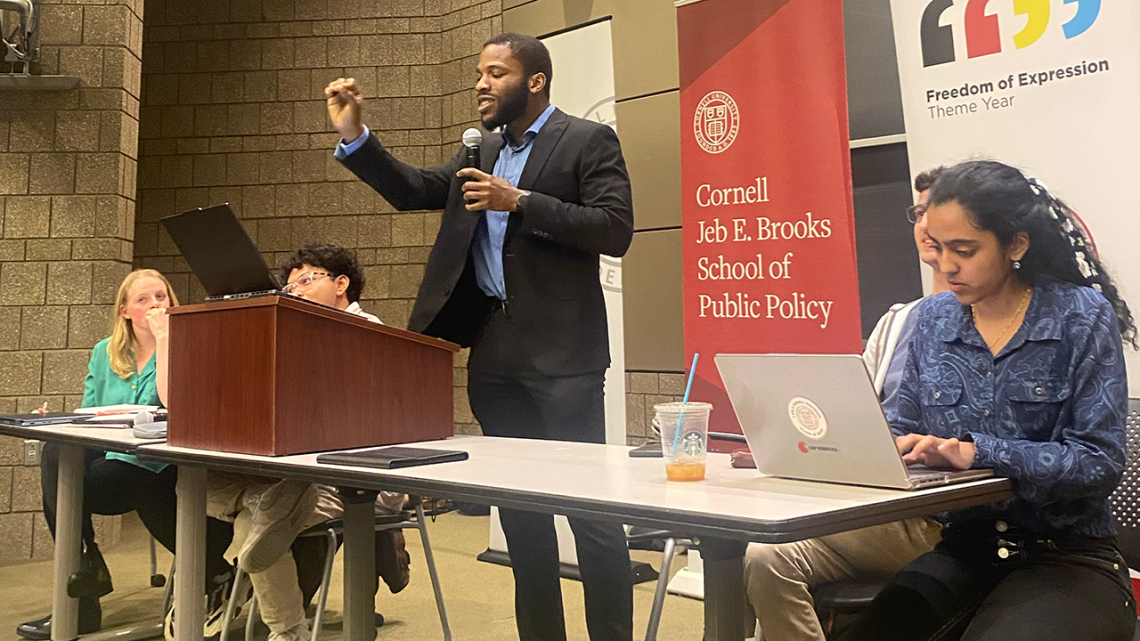
Daniel Obaseki, A&S ’24 affirms freedom of speech at the finale of a four-debate sequence led by the ILR School this semester as part of Cornell’s Freedom of Expression Theme Year.
News directly from Cornell's colleges and centers
Freedom of Expression debates reflect civil discourse
By Mary Catt
Freedom of speech is the best policy, the audience voted at the finale of a four-debate sequence led by the ILR School this semester as part of Cornell’s Freedom of Expression Theme Year.
“This series showcased once again how vigorous but respectful debate is at the heart of freedom of expression and an essential element of the academic life of the university,” said Alex Colvin, Ph.D. '99, the Kenneth F. Kahn '69 Dean and the Martin F. Scheinman '75, M.S. '76, Professor of Conflict Resolution.
“Is a policy of absolute freedom of speech, without exceptions, the best policy?” on April 10 featured students from the Cornell Speech and Debate Program and the Cornell Political Union. ILR and the Jeb E. Brooks School of Public Policy sponsored the event.
Arguing in ILR’s Ives Hall to affirm freedom of speech were Ben Ash, AEP ’26; Daniel Obaseki, A&S ’24, and Rushika Prasad, ENG ’26.
Arguing to oppose the question were Ram Orfanel, A&S '25, Amalia Schneider ILR ’24 and Margot Treadwell ILR ’24.
Brooks Dean Colleen Barry said the exchange “was exactly the type of event we had hoped our students would engage in when we launched the Freedom of Expression Theme Year. On our campus and beyond, respectful debate and civil discourse across differing viewpoints matters more than ever in advancing solutions to pressing societal challenges.”
Treadwell said, “As Cornellians, we don’t shy away from complex issues or hard conversations. Having the opportunity to debate about freedom of expression in front of a large crowd of students was an opportunity to celebrate and dig into all that Cornell offers.”
ILR Senior Lecturer Sam Nelson, who directs the speech and debate program, said, “Two student groups, squaring off to disagree on a contentious issue and using civil discourse, logic and their intellect to make their points -- I loved everything about it.”
The ILR School, its Office of Engaged & Experiential Programs and the debate program, based at ILR, led the series in collaboration with the SC Johnson College of Business, the Einhorn Center for Community Engagement and the Brooks School.
The debate series was designed to model constructive disagreement. The first debate asked if union organizers should have free speech rights in the workplace. The second and third debates, one in Spanish, explored free expression and business.
In opening the final debate, Ariel Avgar, ILR’s David M. Cohen Professor of Labor Relations, senior associate dean for Outreach and sponsored research, and a conflict management expert, said the series demonstrated that as a university community, “We are capable of having robust, vibrant, and substantive discussions and, even, disagreements around sensitive, delicate and nuanced issues.”
“One of the hallmarks of these debates has been the focus on issues, not on the individuals making arguments around those issues. There is a longstanding principle in the negotiation domain that has played out very clearly in our debates, which is to be hard on the issues and soft on the people.”
“Real change will not be achieved through statements and counter statements. Rather, meaningful progress on the biggest challenges of our day will happen through deep and serious discourse about differing perspectives and worldviews. This is the very type of exchange that we engaged in through the Freedom of Expression debate series. We are a university designed as one of society’s core vehicles for real, meaningful exchange. Our debate series has given us a clear model for how to continue to do so.”
Media Contact
Get Cornell news delivered right to your inbox.
Subscribe
